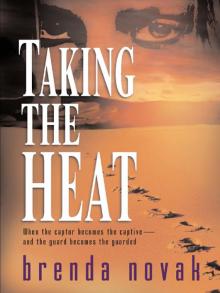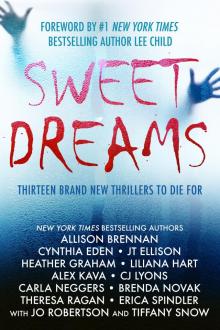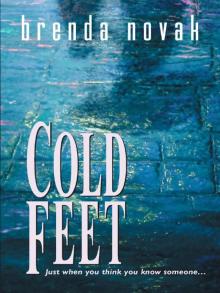- Home
- Brenda Novak
Her Darkest Nightmare Page 3
Her Darkest Nightmare Read online
Page 3
The guards started to yank him back, to show him that he’d better not get out of control again. No doubt they were angry about before. One of their fellow officers had been shuttled off to Medical nursing a broken nose because of Garza hitting him with his head. But, lowering her clipboard, Evelyn motioned for them to leave him be. She was here to study, not punish. That distinction was important to her own humanity. “I’m your new doctor.”
“No, you’re my next victim,” he said. Then he made kissing noises and smiled, revealing the jagged, broken front teeth he’d gotten from gnawing at the cinder-block wall of his last cell.
* * *
Evelyn tried not to let the threats she received trouble her. On the whole, considering how frightening and explicit the inmates could get, she coped with what she heard pretty well. Some threats were to be expected when dealing with the worst criminal element in America. And she could usually understand the behavior, even if understanding didn’t equal justification. Many of the men she dealt with attempted to gain control in a world where they had no control by inducing fear in others. That gave them power, to a degree. Or sometimes they threatened her simply because they wanted to be despised if they could no longer be admired, wanted to at least matter.
But even after she’d left Hanover House for the day, she couldn’t erase the disturbing image of Anthony Garza and his evil smile from her mind. While he might’ve been showing his displeasure with an unwelcome transfer in the only way he felt he could, she was convinced there was more to his “next victim” comment than a desire to frighten her. Something about him and their brief exchange carried an air of authenticity that confirmed the suspicion she’d had when his file first came across her desk. Maybe he’d killed so many of the women he’d been married to in order to avoid nasty divorces, for revenge because they were planning to leave him or for the small amount of insurance money he stood to gain. But he was, at heart, a lust killer—someone who took human life simply for the pleasure of it.
Which made her wonder if he’d murdered more women than just those three.
She was willing to bet he had—
“You going to pay for that?”
A deep voice jarred her out of her thoughts. She’d been standing at the coffee machine, absently stirring the cup she’d poured several seconds earlier. She wasn’t anxious to head back out into the cold. The storm had hit full force, dropping the temperature to twenty below.
But it wasn’t the cashier who’d confronted her. It was the Alaska State Trooper she’d briefly dated over the summer—if a couple of meals, one kiss and several telephone calls could constitute “dating.” His name was Benjamin Murphy, but the locals called him Sergeant Amarok. He’d told her he’d received that nickname—Inuktitut for “wolf”—in grade school after some bully picked a fight with him. Apparently, he’d won that fight. He looked like he could win just about any fight.
Only twenty-nine, Amarok was wearing a heavy coat that made his shoulders appear even broader than usual and a hat with flaps designed to protect everything but his vivid blue eyes. She could see the rest of his face only because he hadn’t bothered to close the part of the hat that covered his jaw and mouth.
Considering the ice crystals caught in his dark beard growth, he looked as if he could use something hot himself, if only she’d get out of the way.
Because things had ended badly between them, she smiled in an attempt to be friendly. “Would you haul me off to jail for stealing a couple of swallows?”
He didn’t return her smile. He angled his head toward the blizzard wreaking havoc beyond the cheerful music and bright lights of Quigley’s Quick Stop. The storm had hit later than expected, enabling her to delay her departure from Hanover House until nearly nine o’clock. Thanks to a satellite dish she had Internet service, so she could work at home. But a heavy snow like this could, and often did, knock it out. And she didn’t really enjoy being there. As comfortable, even fashionable, as her little cabin was, the place was too quiet. It made her feel completely cut off—especially during a blizzard, which could potentially interrupt her phone service, too. There weren’t any cell towers out here to provide an alternative. She didn’t even own a smartphone anymore; she’d sold hers before moving to the remote outpost of Hilltop.
“Might be tough hauling you anywhere in this,” he said.
“Good thing you have a snowplow on your truck.” He also had four-wheel-drive, off-road tires, a row bar, a winch and enough emergency supplies to last a week or more in such weather. Police officers in these parts had to be prepared for every eventuality.
He removed his gloves and motioned to his vehicle, which was parked next to her BMW. “Had a snowplow. The hydraulic lift went out early this afternoon. A shovel doesn’t do me much good if I can’t lower it.”
She could see that he’d left his truck running. He’d turned off the headlights so they wouldn’t shine into the store, but his windshield wipers remained hard at work, swishing in quick time as they struggled to keep up with the swirling snow.
She should’ve left her engine running—wipers, too, she realized. She hadn’t been thinking of the practicalities when she stopped for coffee and some cereal for breakfast in the morning; she’d been too caught up in Anthony Garza and what he might have done. Not only that, but it was habit to turn off her car and take the keys. People in Boston didn’t leave their vehicles running if they wanted to have a vehicle when they got back.
“That’s bad luck,” she said.
Seemingly unconcerned about the state of his dark hair, he took off his hat and scratched his head. He was confident, probably knew he was sinfully attractive regardless of what his hair looked like. Or, after she’d disappointed him so completely, he didn’t care what she thought one way or the other.
“It’s not bad luck for me,” he said. “I get to go home instead of working all night. It’s bad luck for everyone else. Without a plow, I can’t help clear, which means it’ll take Phil that much longer to do it alone.” He studied her for a few seconds with an intense expression, one that gave her hope he might show some sign of softening, of forgiving her. But that didn’t happen. “You might want to head home before the roads become impassable, in case he hasn’t covered that side of town in a while. It won’t be a priority, since there’s just you and a couple of other folks out that way. He’ll plow the more traveled routes first.”
Which meant it might already be too late.
She should’ve built her cabin closer to everyone else. When she’d chosen the location, there hadn’t been any snow on the ground. And she hadn’t considered how lonely it would be living apart from most of the rest of Hilltop’s residents. She hadn’t known them so she hadn’t thought it would matter. She’d only considered the serenity and the view and the fact that she might want a break from the other doctors.
“Right.” She lifted her cup in a salute. “Have a nice evening.”
He nodded, then watched her pay for a box of Frosted Mini-Wheats and her coffee. She could feel his eyes boring holes into her back as she ducked her head and stepped into the weather and felt as self-conscious as she always felt these days when she accidentally ran into him.
She was wearing snow boots and a heavy coat, but she’d left her hat at the office. She had a terrible feeling she was going to regret not going back for it when she got behind the wheel and pushed the start button and nothing happened.
“Come on. You’re only three years old. And you certainly cost me enough,” she muttered to her car, and tried again.
The starter wouldn’t so much as turn over. What was wrong? The battery? The alternator? Something else? How could her Beamer have fired up so easily at HH but not now? She hadn’t been in the store that long.…
With a curse, she smacked the steering wheel and leaned back. The snow covering her windshield left her in complete darkness, except for the dim glow of her instrument panel. And it was so cold. Even out of the wind. Cold and dark. This place was always so damn c
old and dark!
Take a deep breath. Calm down. Try again.
She did, but with no better results. Then she really began to worry. It wasn’t as if she could call Triple A and wait in the warmth of the store. Triple A didn’t have service out here. Why would they? There weren’t enough people to make it profitable. But if she didn’t get her car started soon, she’d never make it home, not in a storm like this and not with only one plow in operation.
“Damn it!” She was going to have to go back into the store and ask Amarok to help her. But she didn’t really want to do that. She remembered his thinly veiled disapproval when she first came to town, his opposition to the institution and his skepticism of her goals, her car—almost everything related to her. He didn’t want her bringing a bunch of serial killers to his hometown. He’d all but asked her to stay the hell away. Then they’d started seeing each other and he’d come around, to a point. Until he wanted more than she could give him and everything fell apart.
Squeezing her eyes closed, she pinched the bridge of her nose while she gathered herself together. Then she braced for another blast of icy snow, opened her door—and nearly hit him. The sergeant had already come out. It looked as if he’d been about to knock on her window.
“Sorry!” She had to raise her voice above the howl of the wind. “Didn’t mean to—”
“What’s wrong?” he broke in, getting right to the point. He didn’t want to be out in the storm any longer than he had to be. Evelyn felt the same.
“Car won’t start.”
“Why not?”
She shouldn’t have left the prison without her hat. But by the time she’d realized she’d forgotten it, she’d been too lazy to pass through security again, figured she could survive a quick dash to her car. She was paying for that decision now, just as she was paying for keeping her BMW instead of trading it in for a truck. “The ultimate driving machine” wasn’t built for this kind of weather. “Don’t know. Started fine at the center.”
“Let me try.” He waved her out of the driver’s seat, but she didn’t see how he’d be able to do anything more than what she’d done. Maybe he wanted to hear what happened when he punched the starter button.…
The engine made no sound, same as with her.
“Get in the store!” he snapped as he reached for the lever that would open her hood.
Thanks to her gloves, it wasn’t easy to hold the hair out of her face, but she tried. “What can you feasibly do in a storm like this?”
“Without more light? Most likely nothing.”
“So … what if we can’t get it started?”
“I’ll give you a ride and we’ll deal with this tomorrow.”
If the storm was even over by then. She could be stuck indefinitely at her house with only Sigmund, her cat, for company.
Just in case that possibility became a reality, she went inside and loaded up on more cold cereal, some cans of soup, cookies, crackers—anything she could find that looked remotely appealing. The cashier, Garrett Boyle, a grisly old widower who lived in the back of the store, raised his scruffy eyebrows when she began emptying his shelves, but stocking up on food made her feel as if she was protecting against the worse.
Amarok came in, stamping snow off his boots, just as Garrett was ringing her up.
“Any luck?” she asked.
Amarok frowned. “No, and I can’t tell what’s wrong. But I’m not much of a mechanic. I’ve certainly never worked on a Beamer. You don’t see many of them in Hilltop.”
She was pretty sure only she and a few of the other doctors drove luxury cars. But she didn’t do it to be ostentatious. Her small sedan wasn’t even one of the more expensive models. Instead of trading it in, she’d kept it as a security blanket of sorts. By moving here she was giving up every other aspect of the life she’d built in Boston. She hadn’t been ready to part with her car, too. The idea of that had felt too final, as if she’d never be able to leave Alaska if she did.
“I hope I can find someone to fix it,” she said.
“You will. Tomorrow. Come on, I’ll take you home.” His gaze dipped to the groceries in her arms, then shifted to all the others piled on the counter. “Don’t tell me there’s nothing to eat at your house.”
“Other than a year’s supply of cat food, there’s nothing to eat at my house,” she said. “As you know, I’m rarely there.”
He shook his head. “You don’t belong in Alaska.”
“Excuse me?” She blinked up at him until he glanced away.
“Never mind.” He lifted a box out of one sack. “At least you bought donuts. Those are pretty imperative in an emergency.”
He was playing off his first comment so she wouldn’t pursue the “You don’t belong in Alaska” statement. “They’d be better than going without,” she said.
“I’d have to agree with you there. Let’s go.” He grabbed the four bags she couldn’t carry and toted them to his truck. She followed, letting him break the wind, but her face and ears were numb before she could even get in and close the door. Fortunately, he’d left the heater running along with the engine and wipers.
“Why do you live in this godforsaken place?” she asked.
“I was born here,” he said as if she didn’t already know. Then he got on his radio. “Phil, this is Amarok. Do you copy?”
“I copy, Sergeant…,” came the static-filled response.
“How’s the removal going?”
“Not so … can’t keep … on my own.”
“Just do your best.”
“… Going … long night.”
“Listen, Phil, when’s the last time you were over by Dr. Talbot’s place?”
“Dr. who?”
The radio crackle increased, making it difficult to decipher his words. “Talbot. The woman who runs Hanover House.”
Nothing. No response.
“Talbot. Do you copy?”
“Yes, Sarge. Haven’t … More than I can do … But I finished that road that leads to where the other shrinks live up the hill, if that helps.”
It didn’t, but Amarok didn’t say so. “Any chance you can get over her way?”
“Not unless you want … people stranded … this side of town.”
“No. That would only make things worse. Thanks.”
“… keep … what I’m doing?”
“Roger that.”
Evelyn eyed Amarok as he hung up. “No plow?”
“No plow,” he repeated.
“What does that mean?”
“It means we’d be crazy to head over to your place and risk getting stuck in drifts that have to be three or four feet high by now.”
She gripped her purse tighter. “You don’t think we can get through? Even with chains?”
“I’d rather not try. I wouldn’t want to wind up in this all night; would you?”
“Definitely not.” He made a good point, but … “What else can we do? Head back to Hanover House?”
“The prison is even farther out.”
“But I’d have to go all the way to Anchorage to get a motel.”
Popping the transmission into reverse, he started to back up. “That’s not possible, either. You’ll have to stay at my place.”
She felt her jaw drop. “What?”
He stopped the truck and gestured to the pay phone attached to the side of the building, which she could barely see, thanks to the snow. “This isn’t some ploy on my part. If you’d rather get out and call one of your doctor friends, feel free.”
With the possible exception of the sixty-three-year-old Stacy, who was sick, she didn’t really have any doctor friends. She had professional associates. They were unfailingly polite to each other, but she wouldn’t feel comfortable imposing on them. Running a place like Hanover House could get difficult with so many egos involved. She suspected some of her colleagues resented how hard she pushed them and the rest of the staff. It was almost as if they thought she was trying to upstage them when she was merely determ
ined to get results. “I’ve made a friend who lives between here and Anchorage,” she suggested, thinking of Lorraine.
“Closer to here or closer to Anchorage?” He almost had to shout to be heard over the voices that were cutting in and out on the radio, the whir of the heater, the chug of the motor and the wail of the storm.
“Closer to Anchorage,” she admitted. A lot closer to Anchorage.
His eyebrows slid up. “That’s your closest friend?”
She glanced away. “I don’t socialize a great deal, which I’m sure comes as no surprise to you.”
“By choice,” he pointed out.
She let her breath go in a silent sigh. “I’m sorry, Amarok. If you want me to apologize again, I will.”
“I’m not asking you to apologize. I’m not asking you for anything. I’m just saying, if a friend in Anchorage is your best alternative, you’ll have to stay with me whether you like it or not.”
“I’m fine with it, as long as … as long as you don’t mind.”
He didn’t try very hard to make her feel welcome, but she supposed she should be happy for what reassurance he offered. “I don’t mind. Not if you plan on sharing.”
He didn’t specify what.
3
I didn’t know what made people want to be friends. I didn’t know what made people attractive to one another. I didn’t know what underlay social interactions.
—TED BUNDY, SERIAL KILLER, RAPIST, KIDNAPPER AND NECROPHILIAC
Evelyn was a little drunk. She suspected Amarok was, too. He sat below her, his back against the couch on which she lay, as they started on a second bottle of Salmonberry Wine, a local favorite. The alcohol had mellowed him and made her talkative, maybe too talkative, but she couldn’t remember when she’d had a better time, especially with nothing but Led Zeppelin playing in the background, a fire raging in the hearth and a man she barely knew for company. With the storm pummeling the house and flame the only light in Amarok’s cabin-like living room, it felt as if they were camping on the very edge of civilization.
“I can’t believe we ate all the junk I bought.” She groaned, gazing at the candy bar, chips and cookie wrappers strewn on the floor.

 Falling For You
Falling For You A California Christmas
A California Christmas When I Found You
When I Found You Sanctuary
Sanctuary Home for the Holidays (Silver Springs)
Home for the Holidays (Silver Springs) One Perfect Summer
One Perfect Summer Christmas in Silver Springs
Christmas in Silver Springs Before We Were Strangers
Before We Were Strangers Coulda Been a Cowboy
Coulda Been a Cowboy Blind Spot
Blind Spot That One Night
That One Night The Perfect Murder
The Perfect Murder Falling For You (Dundee Idaho)
Falling For You (Dundee Idaho) In Close
In Close Home for the Holidays
Home for the Holidays A Dundee Christmas
A Dundee Christmas The Perfect Couple
The Perfect Couple On a Snowy Christmas
On a Snowy Christmas Her Darkest Nightmare
Her Darkest Nightmare When We Touch
When We Touch A Winter Wedding (Whiskey Creek)
A Winter Wedding (Whiskey Creek) The Perfect Liar
The Perfect Liar Dead Silence
Dead Silence Baby Business
Baby Business Shooting the Moon
Shooting the Moon A Home of Her Own
A Home of Her Own Taking the Heat
Taking the Heat Of Noble Birth
Of Noble Birth Every Waking Moment
Every Waking Moment Face Off
Face Off Expectations
Expectations Hello Again
Hello Again When Snow Falls
When Snow Falls Come Home to Me
Come Home to Me Be Mine at Christmas
Be Mine at Christmas The Secrets She Kept
The Secrets She Kept In Seconds
In Seconds No One but You--A Novel
No One but You--A Novel Dear Maggie
Dear Maggie Hanover House: Kickoff to the Hanover House Chronicles
Hanover House: Kickoff to the Hanover House Chronicles When Summer Comes
When Summer Comes Discovering You
Discovering You Inside b-1
Inside b-1 Body Heat
Body Heat Sweet Dreams Boxed Set
Sweet Dreams Boxed Set A Family of Her Own
A Family of Her Own Stop Me
Stop Me Inside
Inside The Heart of Christmas
The Heart of Christmas In Seconds b-2
In Seconds b-2 Through the Smoke
Through the Smoke The Other Woman
The Other Woman We Saw Mommy Kissing Santa Claus
We Saw Mommy Kissing Santa Claus 05 Take Me Home for Christmas
05 Take Me Home for Christmas Killer Heat
Killer Heat This Heart of Mine
This Heart of Mine Until You Loved Me--A Novel
Until You Loved Me--A Novel Cold Feet
Cold Feet Snow Baby
Snow Baby Dead Giveaway
Dead Giveaway Face Off (Dr. Evelyn Talbot Novels)
Face Off (Dr. Evelyn Talbot Novels) Just Like the Ones We Used to Know
Just Like the Ones We Used to Know A Baby of Her Own
A Baby of Her Own Take Me Home for Christmas wc-5
Take Me Home for Christmas wc-5 Finding Our Forever
Finding Our Forever Historical Romance Boxed Set
Historical Romance Boxed Set Right Where We Belong
Right Where We Belong Big Girls Don't Cry
Big Girls Don't Cry